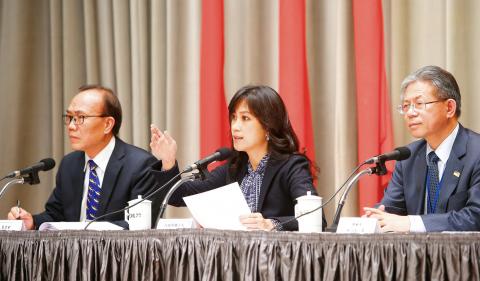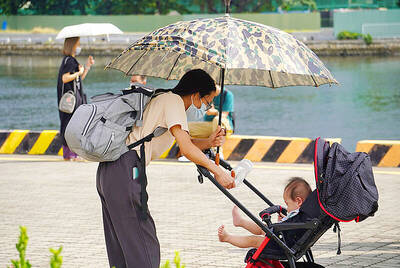Premier Su Tseng-chang (蘇貞昌) yesterday approved plans to subsidize furloughed or dismissed workers, as well as companies and entrepreneurs amid business woes caused by COVID-19 outbreak that began in China, with proposed funding totaling NT$4.12 billion (US$137.52 million).
The subsidies, which are to be sourced from the Ministry of Labor’s Employment Stabilization Fund and Employment Insurance Fund, would cover new and expansions of existing projects, Workforce Development Agency Deputy Director-General Shih Chen-yang (施貞仰) told a news conference in Taipei.
To encourage furloughed employees to undergo training while on leave, the ministry has increased the subsidies for training courses from NT$1.9 million to NT$3.5 million and raised the maximum class time for each worker from 100 to 120 hours per month, Shih said.

Photo: CNA
Employees who undergo training provided by their employers or the ministry would be paid the minimum hourly wage of NT$158, she said.
Deputy Minister of Labor Lin San-kuei (林三貴) said that the program was implemented late last month and would last three to six months depending on the COVID-19 situation.
People who are laid off amid the outbreak are eligible for monthly unemployment subsidies for six to nine months at 60 percent of their insured salary under their labor insurance plan, Shih said.
Parents who are dismissed during the crisis and have children receiving secondary education would receive a subsidy of between NT$4,000 and NT$6,000 per child, while parents of university students are eligible to receive between NT$13,600 and NT$24,000 per child, she said.
People who are furloughed can apply for a monthly subsidy of 50 percent of the difference between the monthly minimum wage, NT$23,800, and their insured monthly salary under the labor insurance system, Shih said, adding that the subsidies would be paid for three to six months.
For example, an employee whose insured monthly salary is in the highest bracket of NT$45,800 or more would receive NT$11,000 in monthly subsidies, she said.
Employers that hire a person who has been unemployed for at least 30 days would receive a monthly subsidy of NT$5,000 per new hire for up to six months, while those that hire a person who has been jobless for at least three months would receive NT$9,000 monthly per new worker for up to 12 months, Shih said.
Employers that hire a senior or disadvantaged employee would receive between NT$11,000 and NT$13,000 per month per worker hired for up to 12 months, she said.
If the outbreak affects sectors for a prolonged period, the next stage of subsidy programs would be initiated, which would include subsidies for furloughed employees equaling 50 percent of their insured monthly salary and the minimum wage, and 70 percent of the difference when furloughed workers receive training while on leave, Shih said.
At that stage, the public sector would start opening vacancies of three to six months that are paid the minimum wage, she said.
Firms that improve their facilities during the crisis would receive subsidies of NT$150,000 to NT$2 million under an expanded project, while funding for a project concerned with the well-being of employees that covers caregivers for employees in need, employee counseling, stress relief and facilities for employees with disabilities has been raised by NT$24 million, Shih said.
Qualifications for the ministry’s entrepreneurship subsidies have been relaxed, with anyone aged 20 or older who establishes a start-up after Jan. 15 now eligible for subsidies of up to NT$2 million, she said.
As of yesterday, there were 1,951 furloughed employees from 49 entities nationwide, she added.
Employers should still pay furloughed workers the minimum wage of NT$23,800, Lin said.

DEFENDING DEMOCRACY: Taiwan shares the same values as those that fought in WWII, and nations must unite to halt the expansion of a new authoritarian bloc, Lai said The government yesterday held a commemoration ceremony for Victory in Europe (V-E) Day, joining the rest of the world for the first time to mark the anniversary of the end of World War II in Europe. Taiwan honoring V-E Day signifies “our growing connections with the international community,” President William Lai (賴清德) said at a reception in Taipei on the 80th anniversary of V-E Day. One of the major lessons of World War II is that “authoritarianism and aggression lead only to slaughter, tragedy and greater inequality,” Lai said. Even more importantly, the war also taught people that “those who cherish peace cannot

STEADFAST FRIEND: The bills encourage increased Taiwan-US engagement and address China’s distortion of UN Resolution 2758 to isolate Taiwan internationally The Presidential Office yesterday thanked the US House of Representatives for unanimously passing two Taiwan-related bills highlighting its solid support for Taiwan’s democracy and global participation, and for deepening bilateral relations. One of the bills, the Taiwan Assurance Implementation Act, requires the US Department of State to periodically review its guidelines for engagement with Taiwan, and report to the US Congress on the guidelines and plans to lift self-imposed limitations on US-Taiwan engagement. The other bill is the Taiwan International Solidarity Act, which clarifies that UN Resolution 2758 does not address the issue of the representation of Taiwan or its people in

The Philippines yesterday criticized a “high-risk” maneuver by a Chinese vessel near the disputed Scarborough Shoal (Huangyan Island, 黃岩島) in a rare incident involving warships from the two navies. The Scarborough Shoal — a triangular chain of reefs and rocks in the contested South China Sea — has been a flash point between the countries since China seized it from the Philippines in 2012. Taiwan also claims the shoal. Monday’s encounter took place approximately 11.8 nautical miles (22km) southeast” of the Scarborough Shoal, the Philippine military said, during ongoing US-Philippine military exercises that Beijing has criticized as destabilizing. “The Chinese frigate BN 554 was

The number of births in Taiwan fell to an all-time monthly low last month, while the population declined for the 16th consecutive month, Ministry of the Interior data released on Friday showed. The number of newborns totaled 8,684, which is 704 births fewer than in March and the lowest monthly figure on record, the ministry said. That is equivalent to roughly one baby born every five minutes and an annual crude birthrate of 4.52 per 1,000 people, the ministry added. Meanwhile, 17,205 deaths were recorded, resulting in a natural population decrease of 8,521, the data showed. More people are also leaving Taiwan, with net